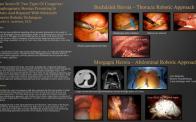ALERT!
This site is not optimized for Internet Explorer 8 (or older).
Please upgrade to a newer version of Internet Explorer or use an alternate browser such as Chrome or Firefox.
Charles Anderson
Charles A. Anderson, M.D.

Suite 201
Background
Creighton University School of Medicine
Tripler Army Medical Center - Surgery Residency
Bayne-Jones ACH - General Surgeon
University of Tennessee at Memphis - Cardiothoracic Fellow
Ochsner Clinic Foundation - Cardiac Transplant Fellow
Tacoma General Heart Hospital - Staff Surgeon 2006-2012
Saint Joseph's of Atlanta - Staff Surgeon 2/2012
Other Interests
Ventricular Assist Devices and heart failure
Robotic intracardiac surgery
Robot assisted thoracic surgery
Mitral valve repair techniques - minimally invasive
Sternal and chest wall reconstruction
Minimally invasive surgery for atrial fibrillation
Instrument design
Research
J Thorac Cardiovasc Surg. 2014 Apr;147(4):1202-1210; discussion 1210-1. doi: 10.1016/j.jtcvs.2014.01.004. Epub 2014 Jan 12.Reduced anticoagulation after mechanical aortic valve replacement: interim results from the prospective randomized on-X valve anticoagulation clinical trial randomized Food and Drug Administration investigational device exemption trial.Puskas J1, Gerdisch M2, Nichols D3, Quinn R4, Anderson C3, Rhenman B5, Fermin L5, McGrath M6, Kong B7, Hughes C8, Sethi G9, Wait M10, Martin T11,Graeve A3; PROACT Investigators.Author information AbstractOBJECTIVE:
Under Food and Drug Administration investigational device exemption, the Prospective Randomized On-X Anticoagulation Clinical Trial (PROACT) has been testing the safety of less aggressive anticoagulation than recommended by the American College of Cardiology/American Heart Association guidelines after implantation of an approved bileaflet mechanical valve.
METHODS:
In this first limb of the PROACT, patients with elevated risk factors for thromboembolism were randomized at 33 US centers to receive lower dose warfarin (test international normalized ratio [INR], 1.5-2.0) or continue standard warfarin (control INR, 2.0-3.0), 3 months after mechanical aortic valve replacement. The INR was adjusted by home monitoring; all patients received 81 mg aspirin daily. Adverse events were independently adjudicated.
RESULTS:
A total of 375 aortic valve replacement patients were randomized into control (n = 190) and test (n = 185) groups from September 2006 to December 2009. The mean age ± standard deviation was 55.2 ± 12.5 years; 79% were men; and 93% were in sinus rhythm preoperatively. Calcific degeneration was present in 67%; active endocarditis was excluded. Concomitant procedures included coronary artery bypass grafting (27%), aortic aneurysm repair (14%), and other (25%). The follow-up duration averaged 3.82 years (755.7 patient-years [pt-yrs] for control; 675.2 pt-yrs for test). The mean INR was 2.50 ± 0.63 for the control and 1.89 ± 0.49 for the test groups (P < .0001). The test group experienced significantly lower major (1.48% vs 3.26%/pt-yr; P = .047) and minor (1.32% vs 3.41%/pt-yr; P = .021) bleeding rates. The incidence of stroke, transient ischemic attack, total neurologic events, and all-cause mortality were similar between the 2 groups.
CONCLUSIONS:
INR can be safely maintained between 1.5 and 2.0 after aortic valve replacement with this approved bileaflet mechanical prosthesis. With low-dose aspirin, this resulted in a significantly lower risk of bleeding, without a significant increase in thromboembolism.
Copyright © 2014 The American Association for Thoracic Surgery. Published by Mosby, Inc. All rights reserved.
Content Published on CTSNet
Practice Areas
- Cardiac
- Thoracic
- Heart failure
- Coronary disease
- Diaphragm
- Esophagus
- Lung
- Minimally Invasive
- Mitral valve disease
- Robotic
- VATS
- Valve disease

